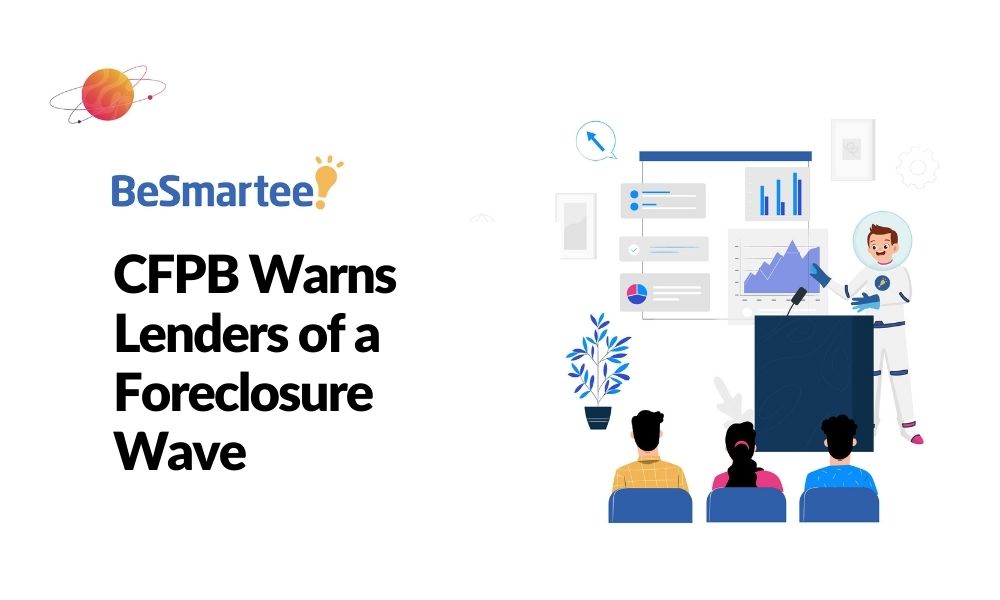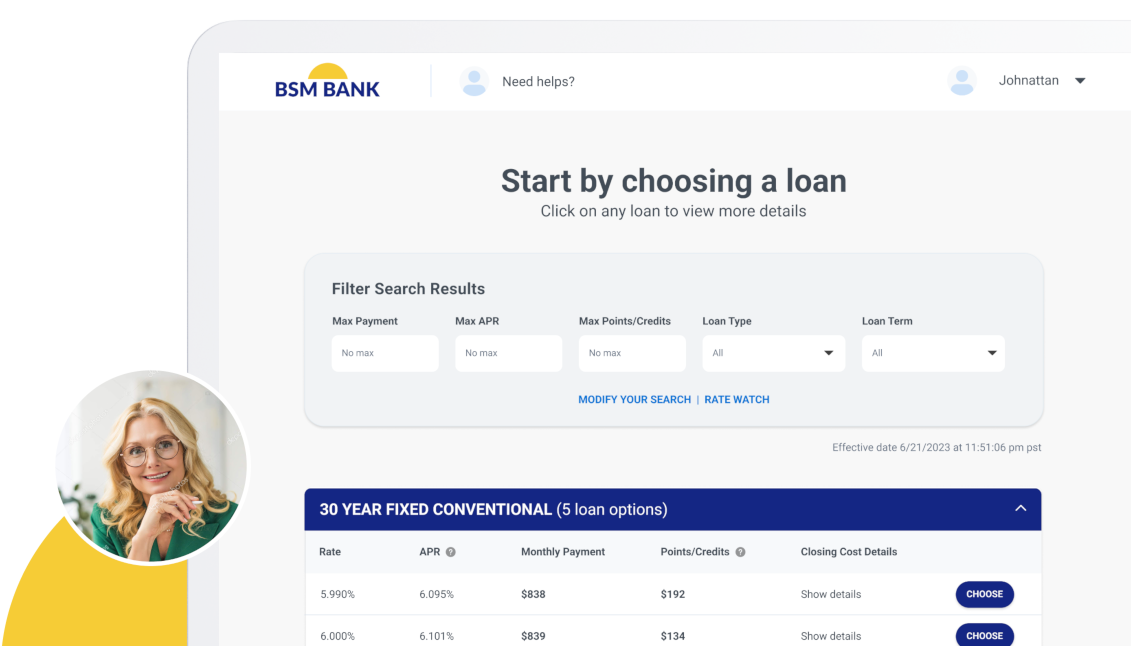Recently, The Consumer Financial Protection Bureau (CFPB) announced its most recent warning to mortgage servicers in anticipation of the so-called foreclosure tidal wave that has been looming large on the horizon. According to the Mortgage Bankers Association, nearly 3 million American homeowners are currently in forbearance, and their allotted period before eviction is steadily getting smaller.
The CFPB has been warning mortgage agencies about this incoming tidal wave of imminent foreclosures as more and more homeowners affected by the global pandemic have been unable to make their normal mortgage payments. Lenders monitoring the legislative updates about the eviction process have been on edge with these announcements.
So, how did we get into this situation? And what is the CFPB planning to ease the growing concerns from millions of homeowners about being evicted while the COVID-19 pandemic still rages throughout the country? BeSmartee delves into the policies in place and future predictions for mortgage agencies below.

Who is the CFPB?
The Consumer Financial Protection Bureau was established in 2011 in response to the financial crisis of 2008. It exists to ensure that laws treat consumers fairly and that they are properly enforced. Their mission is to empower American citizens by spreading information about financial policies and ensuring that every citizen knows their rights under federal law.
However, the CFPB’s main work focuses on existing companies to find and regulate unfair or deceptive financial practices and protect the consumers. They are the primary federal regulation agency in charge of overseeing debt collection, mortgage lending, and financial institutions. They are empowered by the federal government to enact laws and were instrumental in constructing the CARES Act.
The CARES Act
Under the Coronavirus Aid, Relief, and Economic Security Act, $2.2 trillion were allocated toward stimulus for the economy during the COVID-19 pandemic in 2020. Sections 4022 and 4023 addressed mortgages, recognizing that many homeowners found themselves either out of a job or with vastly reduced work hours due to compliance with stay-at-home orders and quarantine procedures.
Homeowners with federally backed mortgages became exempt from foreclosure until August of 2020 and were given the right to ask for forbearance that could last for 180 days. It also imposed a pause on evictions for certain rental units who receive federal assistance, which was projected to affect nearly 30% of all rental units.
Though the CARES Act, only legally affected larger agencies like Freddie Mac, plenty of other private agencies complied as an act of good faith for their borrowers to ensure that many homeowners had the same protections.
These homeowners who have been out of work or otherwise financially impacted have gone into forbearance during the pause on evictions, but those regulations were recently rescinded by the CFPB and are set to expire in the upcoming months.
What is Forbearance?
Forbearance can be described like a pause button for mortgage payments. It doesn’t eliminate any part of a borrower’s debt, but it allows homeowners who temporarily cannot make their mortgage payments to continue living in their homes without the fear of imminent eviction. Depending on the lender, different options exist for borrowers to make up for the paused time. Lenders might ask for:
- A lump sum payment when payments resume to pay for the paused time
- Temporarily larger monthly payments to repay the paused time
- Lengthening the mortgage repayment time by putting the paused months on the back end
With the current legislation, homeowners must be at least 120 days delinquent on their payments before lenders can begin the foreclosure process. However, recent studies by the CFPB have shown that over 2 million Americans are over 90 days delinquent as of the beginning of April 2021. The halt on evictions and foreclosure is coming to an end, and these consumers will be facing imminent foreclosure as the economy begins to open up.
The concern is that the majority of these citizens may find themselves suddenly homeless in a little under a few months. That brings us to the recent announcement and how the CFPB plans to rectify the situation to everyone’s benefit.
Mortgage Servicers Under Scrutiny
The CFPB plans to propose an amendment to Regulation X which would extend the review period for mortgage agencies to review homeowners currently in forbearance until the end of 2021. Essentially, servicers would be prohibited from enacting evictions until 2022 with the new amendment.
While the CARES Act primarily affects federally backed mortgages, the CFPB is looking to implement regulations that would affect all organizations in the industry, thereby ensuring equal and fair treatment for all homeowners. Many private organizations have also complied with the CARES Act, but with a blanket protection all homeowners could feel safe knowing that the majority of lenders must comply.
Subscribe to BeSmartee 's Digital Mortgage Blog to receive:
- Mortgage Industry Insights
- Security & Compliance Updates
- Q&A's Featuring Mortgage & Technology Experts
This extension would be beneficial to both homeowners and mortgage agencies since it permits agencies to offer certain options to homeowners in order to allow them to keep their homes and get money flowing back into their mortgage accounts. In addition to the extension, the CFPB has proposed certain aspects in their legislation that would help homeowners and mortgage organizations get back on track.

Loan Modifications
One aspect of the extension allows mortgage lenders to offer specific modifications to borrowers affected by COVID-19 who are in danger of having their forbearance period expire in the near future. In the past, these modifications would not have been allowed based on incomplete applications, but this proposed amendment would now consider those applications valid for these purposes.
The options offered would have certain safeguards to protect the consumers, but borrowers would not need to be evaluated for every single option like they usually do under Regulation X. Instead of going through every choice, lenders could recommend specific choices that would work best for the borrower. This proposed legislation could include extending amortization time, although the CFPB is still working out the kinks.
Sending Out Critical Data
Part of the CFPB’s mission statement is to ensure that consumers receive the necessary information to make informed decisions about their finances. During this crisis, the proposed regulations would require mortgage lenders to keep their clients fully apprised of the available options for loan modifications, the safeguards in place, and how it will affect homeowners in the future.
The CFPB was founded in the wake of the 2008 crisis which saw many homeowners lose their homes when the market crashed, and they want to avoid a repeat of that situation. They have been racing to educate borrowers about their financial options and strongly encourage lenders to stay in constant communication with their clients to give them a chance to save their houses from foreclosure.
Enforcing the Rules
As of the end of March, the CFPB specifically warned mortgage agencies to be properly prepared for the incoming foreclosures. They noted that they will be on alert, monitoring how agencies respond to applications for loss mitigation and borrowers who will be part of the massive wave of potential foreclosures in the next few months.
They clarified that agencies who did not take steps to prevent avoidable foreclosures would be censured and punished. Under the Dodd-Frank Act, the CFPB is empowered to take steps to enforce their legislation and they announced that they have every intention to do so to protect consumers and homeowners who have all been impacted by the global pandemic.

Staying Compliant
It is essential to stay on top of the ever-changing landscape of regulations for mortgage agencies and ensure that you are always in compliance. Between potential human error and the rapid changes necessitated by the fast-paced world, staying compliant can be costly if not planned for.
Despite these expenses, falling out of compliance can lead to fines, penalties, and lawsuits, all of which can seriously impact your company’s bottom line. We recommend utilizing new automation technologies to monitor many aspects of your lending process and agency to ensure complete compliance.
With automation technologies, companies can mitigate risk and keep their information transparent for borrowers. BeSmartee’s collaboration tools enable companies to communicate effectively with their clients, manage important documents, and track loan statuses.
Roundup
With the new proposed amendment to Regulation X by the CFPB, mortgage agencies need to be more vigilant than ever about staying in communication with their lenders. As the economy opens up again after the COVID-19 pandemic, lenders will be under increased scrutiny to ensure that homeowners delinquent on their payments are given options to save their homes and avoid unnecessary foreclosures.
Learn why lenders turn to BeSmartee’s mortgage expertise to stay compliant with new proposals and regulations by calling us at (888) 276-1579 or reaching out to us at sales@besmartee.com today.




